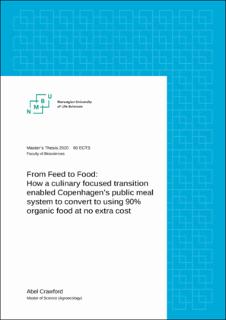| dc.contributor.advisor | Nicolaysen, Anna Marie | |
| dc.contributor.advisor | Sevaldson, Birger | |
| dc.contributor.author | Crawford, Abel Ben Aleck | |
| dc.coverage.spatial | Denmark, Copenhagen | en_US |
| dc.date.accessioned | 2021-02-01T12:05:27Z | |
| dc.date.available | 2021-02-01T12:05:27Z | |
| dc.date.issued | 2020 | |
| dc.identifier.uri | https://hdl.handle.net/11250/2725565 | |
| dc.description.abstract | Our world faces a socio-ecological crisis, and our food system is a significant contributor to that crisis. We must seek to turn our food system into a contributor towards regenerating our earth systems. To do that we need to preference a transition of farming production practices from industrial to diverse-agroecosystems . In the face of national inaction, municipalities can leverage their mandates and assets to contribute towards driving a transition of production practices. The municipal mandate responsibility for public health and the public meal system assets can be leveraged to cook with sustainable produce while also using their purchasing power to source sustainable produce.
This thesis employs a case study approach and draws data from stakeholder interviews, literature and case specific documentation. This data was processed and analysed using a novel approach known as Giga-mapping to make sense of the complexity of the Copenhagen’s public meal system. The aim of this research is to investigate how Copenhagen achieved a 90% organic transition at no extra cost to the food budget across the entire public meal system.
The main findings are that the conversion consultant agencies together with their competence and holistic overview coordinated a series of interventions in Copenhagen’s public food system. They developed and refined a guiding framework (of system goals and rules) inspired by the culinary principles, that was used to guide mindset shifts and a kitchen conversion program that raised the competence of the staff (system structures) to be able to cook organic, healthy delicious food from scratch. The procurement officer utilised the procurement agreement (system rules) as a tool to drive the wholesaler to deliver food such that kitchens had what they needed to cook delicious, healthy and organic meals. The holistic conversion consultant activities were able to coordinate implement system interventions due to the legitimacy and funding that was provided by high level political commitment.
I argue that these crucial components are self-reinforcing and need to be applied as a whole package to such that the kitchen conversion program can transition both the kitchen culture and the procurement agreement to source organic such that the cooks are enabled to cook healthy delicious organic food. | en_US |
| dc.language.iso | eng | en_US |
| dc.publisher | Norwegian University of Life Sciences, Ås | en_US |
| dc.rights | Attribution-NonCommercial-NoDerivatives 4.0 Internasjonal | * |
| dc.rights.uri | http://creativecommons.org/licenses/by-nc-nd/4.0/deed.no | * |
| dc.subject | Public Procurement | en_US |
| dc.subject | public meal systems | en_US |
| dc.subject | agroecology | en_US |
| dc.subject | sustainability transitions | en_US |
| dc.subject | Systems thinking | en_US |
| dc.title | From feed to food : how a culinary focused transition enabled Copenhagen’s public meal system to convert to using 90% organic food at no extra cost | en_US |
| dc.type | Master thesis | en_US |
| dc.description.version | submittedVersion | en_US |
| dc.description.localcode | M-AE | en_US |

